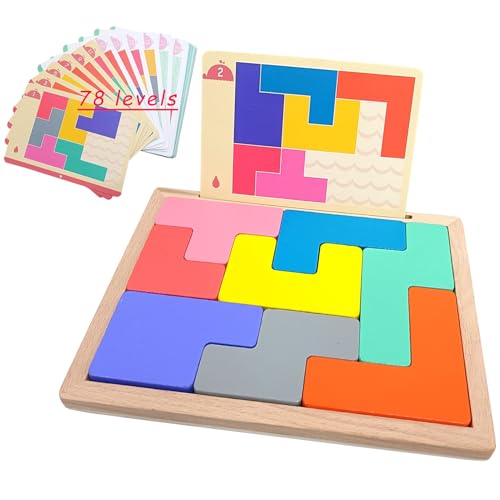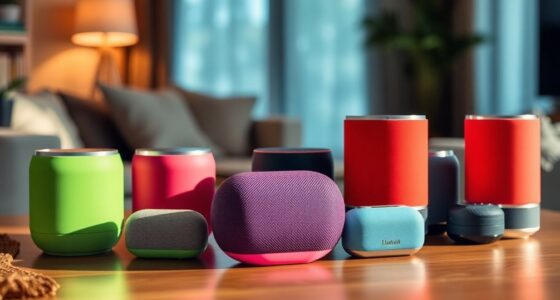If you’re looking for engaging puzzles for Alzheimer’s patients, I’ve found 15 fantastic options that can really boost cognitive health. These puzzles are designed with large, textured pieces and vibrant, easy-to-recognize images, making them perfect for seniors with dementia. Many sets include helpful accessories to enhance the experience and support memory recall. If you want to discover the best options suited for your needs, I’ve got all the details coming up next!
Key Takeaways
- Select puzzles with large, textured pieces to enhance grip and handling for seniors with limited dexterity and cognitive challenges.
- Choose vibrant and high-contrast imagery that evokes positive emotions and promotes recognition, conversation, and engagement.
- Look for puzzles designed for early to mid-stage dementia, ensuring they provide appropriate cognitive stimulation without causing frustration.
- Consider sets that include multiple puzzles for variety and longer engagement, along with accessories for organization and ease of use.
- Ensure safety features like rounded edges and non-toxic materials are present, supporting a secure and enjoyable puzzling experience.
6 Pack Large Piece Puzzles for Seniors
When it comes to choosing puzzles for seniors, especially those in the early to mid-stages of dementia, the Pack Large Piece Puzzles for Seniors stand out as a fantastic option. This set includes six large-piece puzzles that are easy to handle, thanks to their thick, textured pieces. I love how the vibrant illustrations spark engagement and stimulate visual senses. Plus, the eco-friendly materials guarantee durability for repeated use. With clear assembly instructions and excellent customer support, I felt confident in my choice. These puzzles not only promote cognitive activity but also bring joy, making them a meaningful gift for loved ones.
Best For: Seniors, particularly those in the early to mid-stages of dementia, seeking engaging and easy-to-handle puzzles.
Pros:
- Large, textured pieces make handling easier for seniors with reduced dexterity.
- Vibrant colors and intricate designs stimulate visual engagement and cognitive activity.
- Eco-friendly materials ensure durability and safety for repeated use.
Cons:
- May not provide enough challenge for more advanced puzzle solvers.
- Limited to six puzzles, which may not offer enough variety for some users.
- Concerns about potential fading of illustrations with prolonged use.
6 Pack Large Piece Puzzles for Seniors
Pack large piece puzzles for seniors are an excellent choice for those seeking engaging activities for early to mid-stage dementia patients. I love how these puzzles feature 16 large pieces that are easy to handle, measuring 5 inches long, which makes them perfect for unsteady hands. They’re crafted from quality paper and have a unique embossing process for better grip. Each set includes 6 puzzles, along with reference cards and storage bags for organization. These puzzles not only provide cognitive exercise but also bring joy without explicitly mentioning dementia, making them a thoughtful gift for elderly adults.
Best For: Seniors in early to mid-stage dementia seeking enjoyable and engaging cognitive activities.
Pros:
- Large, easy-to-handle pieces suitable for unsteady hands.
- High-quality craftsmanship with unique embossing for better grip.
- Discreet packaging that doesn’t explicitly mention dementia, making it a thoughtful gift.
Cons:
- Limited to 16 pieces per puzzle, which may not challenge more advanced puzzlers.
- The design may not appeal to all seniors, depending on personal interests.
- Requires supervision or assistance for some users who may struggle with the activity.
5 Pack Large Jigsaw Puzzles for Elderly
Large jigsaw puzzles designed for elderly seniors with dementia or Alzheimer’s are an excellent choice for engaging their minds and sparking joyful memories. I love how these 5 packs of 16 large-piece puzzles feature vibrant, nostalgic images that encourage conversations. They strike the perfect balance between challenge and enjoyment, promoting cognitive engagement without frustration. Made from durable cardboard, these puzzles last through multiple uses, and their compact size allows for easy storage and transport. Plus, the discreet packaging makes them a thoughtful gift. I find that they not only stimulate the mind but also foster social interaction, enhancing overall well-being.
Best For: Seniors with early to mid-stage dementia or Alzheimer’s seeking engaging and nostalgic activities.
Pros:
- Encourages cognitive engagement and memory recall through nostalgic imagery.
- Durable cardboard construction ensures long-lasting use and withstands handling.
- Compact size and clear storage bags make it convenient for organization and portability.
Cons:
- Limited to 16 large pieces, which may not provide enough challenge for some seniors.
- May not be suitable for individuals with advanced dementia who require simpler activities.
- The focus on nostalgia may not resonate with all users, depending on personal experiences and memories.
6 Pack Large Piece Puzzles for Seniors
Finding the right puzzles for seniors can make a significant difference in their cognitive engagement and enjoyment. I love the pack of large piece puzzles, which includes six puzzles with 35 pieces each. Measuring about 11.6 x 8.7 inches, they’re perfect for those with limited dexterity. The thick, anti-slip pieces are easy to handle, and the vibrant images stimulate vision and enhance perception. Plus, they’re great for socializing—solving them together can reduce feelings of isolation. With six handy storage bags, they’re easy to organize and transport, making them an ideal gift for seniors or anyone seeking cognitive stimulation.
Best For: Seniors with limited dexterity or vision impairments seeking cognitive engagement and social interaction.
Pros:
- Large, easy-to-handle pieces with an anti-slip surface enhance usability for seniors.
- Vivid, clear images stimulate visual perception and cognitive function.
- Promotes socialization and reduces feelings of isolation through collaborative puzzle-solving.
Cons:
- Limited to only six puzzles, which may not provide long-term variety.
- The relatively small size of the completed puzzles may not satisfy those looking for larger challenges.
- May not be suitable for seniors with advanced cognitive decline who require different types of engagement.
Puzzles Gifts for Dementia and Alzheimer’s Activities for Seniors
If you’re looking for a thoughtful gift that provides both enjoyment and mental engagement for seniors with dementia or Alzheimer’s, the “15 Best Puzzles for Alzheimer’s Patients” is an excellent choice. These wooden puzzles are not only durable but also feature colorful designs that grab attention. Measuring 5.9 inches by 5.9 inches, they offer varying difficulty levels to suit different skill sets. Using simple cards, seniors can easily place blocks by color and shape, promoting cognitive engagement and fine motor skills. These puzzles help alleviate loneliness, foster connections, and bring joy, making them perfect gifts for loved ones.
Best For: Seniors with dementia and Alzheimer’s looking for engaging activities that promote mental stimulation and connection.
Pros:
- Durable and colorful design: Made from sturdy wood with eye-catching designs to maintain interest.
- Varied difficulty levels: Suitable for different skill sets, ensuring accessibility for all seniors.
- Encourages cognitive engagement: Activities help improve fine motor skills and provide a sense of achievement.
Cons:
- Limited complexity: Some seniors may find the puzzles too simple if they have higher skill levels.
- Requires supervision: May need assistance for individuals with severe cognitive decline to ensure they can engage effectively.
- Size limitations: The 5.9-inch dimensions may not be suitable for all types of puzzles or preferences.
6 Pack Large Piece Jigsaw Puzzles for Alzheimer’s and Dementia Activities
Puzzles designed specifically for seniors with early to mid-stage dementia are a fantastic choice for engaging their minds in a meaningful way. I love how these large-piece jigsaw puzzles feature improved embossing, making them easier to handle. Crafted from sturdy blue cardstock, they’re durable enough for frequent use. Each set comes with six puzzles, complete with image reference cards and storage bags, which I find incredibly helpful. The clear instructions make assembly straightforward, ensuring a fun experience without frustration. These puzzles not only stimulate cognition but also make thoughtful gifts for any occasion, bringing joy and engagement to loved ones.
Best For: Seniors with early to mid-stage dementia seeking engaging and therapeutic activities.
Pros:
- Puzzles feature large pieces and improved embossing for easy handling.
- Made from durable blue cardstock, ensuring longevity for frequent use.
- Includes clear instructions and storage bags for convenient assembly and organization.
Cons:
- Limited to specific themes that may not appeal to all users.
- The product packaging does not explicitly mention its suitability for dementia, which may affect some buyers’ perceptions.
- May not provide sufficient challenge for seniors with more advanced cognitive abilities.
24 Large Piece Puzzles for Seniors (6 Pack)
Designed specifically for seniors, the 24 Large Piece Puzzles for Seniors (6 Pack) offer an engaging way to stimulate cognitive function and provide joy. Each puzzle features 24 large, vibrant pieces that are perfect for those with limited dexterity. I love how the eco-friendly materials guarantee they’re safe and easy to clean. The textured design adds a multi-sensory experience, making it even more enjoyable. With six puzzles included, I can easily store them in their bags, keeping everything organized. These puzzles not only entertain but also promote happiness and cognitive engagement, making them a thoughtful gift for any senior.
Best For: Seniors, including those with dementia and Alzheimer’s, who enjoy engaging and stimulating activities.
Pros:
- Large pieces make it easier for those with limited dexterity to handle and complete the puzzles.
- Eco-friendly materials ensure safety and ease of cleaning, promoting a worry-free experience.
- Vibrant imagery enhances visibility and reduces eye strain, making the puzzles more engaging.
Cons:
- Limited variety, as each set contains only six puzzles which may not appeal to everyone.
- The puzzles may not provide enough challenge for seniors who are more experienced or skilled at solving puzzles.
- Storage bags may not be durable enough for long-term use, leading to potential wear and tear over time.
6 Pack Large Jigsaw Puzzle for Seniors
For anyone looking to engage seniors, especially those with Alzheimer’s, the Pack Large Jigsaw Puzzle for Seniors stands out as an excellent choice. This set includes six 36-piece puzzles featuring vibrant animal and scenic themes, perfect for sparking joy. Each piece measures 15 x 10 inches, ensuring they’re easy to handle. The durable materials mean they’ll last through many sessions, making them both practical and enjoyable. Plus, the matching posters and storage bags keep everything organized. I love how these puzzles promote cognitive health while providing a meaningful activity that seniors can cherish, making them a thoughtful gift for loved ones.
Best For: Seniors, especially those with Alzheimer’s, looking for engaging and enjoyable activities that promote cognitive health.
Pros:
- Durable, high-quality materials ensure longevity and reusability.
- Large, easy-to-handle pieces accommodate seniors’ eyesight and dexterity.
- Includes matching posters and storage bags for easy organization and accessibility.
Cons:
- Limited to 36 pieces, which may not provide enough challenge for some seniors.
- The animal and scenic themes may not appeal to everyone’s tastes.
- Not suitable for seniors with advanced dementia who may need simpler activities.
6 Pack Large Piece Puzzles for Seniors with Dementia
Finding engaging activities for seniors with dementia can be challenging, but large-piece puzzles stand out as a fantastic option. I love how these six-pack puzzles feature 20 easy-to-grip pieces with colorful animal themes, making them perfect for those with limited dexterity. The high-contrast posters help with visual recognition, enhancing the overall experience. Made from durable, eco-friendly materials, they’re built for repeated use. Plus, they come discreetly packaged, respecting the dignity of our loved ones. With storage bags for convenience, these puzzles provide cognitive benefits while offering a fun way to engage and stimulate the mind.
Best For: Seniors with dementia or limited dexterity looking for engaging and stimulating activities.
Pros:
- Easy to grip and assemble: Large 20-piece puzzles are designed for seniors, making them accessible for those with dexterity issues.
- High-contrast visual aids: Each puzzle comes with a colorful poster that enhances visual recognition and supports engagement.
- Durable and eco-friendly: Made from thick materials, these puzzles are suitable for repeated use, ensuring long-lasting enjoyment.
Cons:
- Limited number of pieces: With only 20 pieces, more experienced puzzlers may find them less challenging.
- Animal themes may not appeal to everyone: Some seniors may prefer different themes or subjects in puzzles.
- Potential for losing pieces: As with any puzzle, there is a risk of losing pieces over time, which can hinder the puzzling experience.
3 Pack 48 Piece Jigsaw Puzzle for Seniors
The 3 Pack 48 Piece Jigsaw Puzzle is a fantastic choice for seniors, particularly those living with dementia or Alzheimer’s. I love how these puzzles feature large, easy-to-handle pieces that make assembling them a breeze. The vibrant colors and high contrast really help visually impaired seniors engage with the activity. Each set includes three puzzles, along with posters and storage bags, making it convenient to store and reuse. I appreciate that the difficulty level is just right, providing a satisfying challenge without frustration. Plus, if any pieces go missing, customer support is readily available to assist.
Best For: Seniors, particularly those with dementia or Alzheimer’s, looking for engaging and manageable activities.
Pros:
- Large, easy-to-handle pieces enhance accessibility for elderly users.
- Vibrant colors and high contrast improve visibility for visually impaired seniors.
- Includes multiple puzzles and storage options, promoting reuse and convenience.
Cons:
- Limited to 48 pieces, which may not satisfy more experienced puzzle enthusiasts.
- May not provide enough challenge for seniors in later stages of cognitive decline.
- Packaging does not specifically indicate its suitability for dementia, which may affect gifting decisions.
6 Pack Large Piece Jigsaw Puzzles for Seniors
Pack large piece jigsaw puzzles are an excellent choice for seniors, especially those with Alzheimer’s or dementia, as they feature thick, easy-to-grip pieces that enhance dexterity and cognitive skills. I love how these puzzles come in a pack of six, each with 48 vibrant designs like flowers and beaches. The sturdy cardboard makes them durable and reusable. Plus, they’re perfect for family bonding, allowing us to engage and connect while assembling together. With a 4.6-star rating, these puzzles truly promote concentration and memory, making them a thoughtful gift that shows love and care for our elderly loved ones.
Best For: Seniors, particularly those with cognitive challenges like Alzheimer’s or dementia, and anyone looking for engaging family activities.
Pros:
- Large, thick pieces for easy grip, enhancing dexterity and cognitive skills.
- Vibrant themes that promote concentration and make assembling enjoyable.
- Comes in a convenient storage box with six puzzles, fostering social interaction during gameplay.
Cons:
- Limited to only 48 pieces per puzzle, which may not be challenging enough for some users.
- Packaging does not mention dementia or Alzheimer’s, which could be a concern for some buyers.
- May not appeal to younger audiences or those seeking more complex puzzles.
Dementia Activities for Seniors – Wooden Puzzles and Cognitive Training Games
If you’re looking for engaging activities to support seniors with dementia or Alzheimer’s, wooden puzzles offer an excellent choice. These puzzles feature 78 difficulty levels, making them suitable for various abilities and promoting cognitive interaction. I love how their colorful design captures attention, keeping hands busy while reducing feelings of loneliness. The game involves placing wooden blocks into a base according to provided cards, fostering cognitive thinking and mental agility. Measuring about 12.36 x 6.77 inches, they’re durable and perfect for seniors in nursing homes. Overall, these puzzles make ideal gifts that boost cognitive health while providing enjoyable challenges.
Best For: Seniors with dementia or Alzheimer’s seeking engaging activities that promote cognitive interaction and reduce feelings of loneliness.
Pros:
- Engaging and colorful design captures attention, encouraging ongoing participation.
- Offers 78 difficulty levels to cater to a wide range of cognitive abilities.
- Durable construction makes it suitable for use in nursing homes and by seniors with varying skill levels.
Cons:
- May require assistance for some users, depending on their cognitive ability.
- Some individuals might find the puzzles too challenging or too easy, leading to frustration.
- Limited appeal for those who prefer different types of activities or games.
5 Pack Large Jigsaw Puzzles for Dementia and Alzheimer’s Activities
Looking for engaging activities for seniors with dementia or Alzheimer’s? I’ve found that the 5 Pack Large Jigsaw Puzzles are fantastic! Each pack includes 16 large puzzles featuring vibrant animal themes like tigers and elephants, sparking memories and conversations. The durable pieces are easy to handle, making them perfect for early to mid-stage dementia. These puzzles not only stimulate cognitive functions but also promote social interaction. Plus, they come in handy storage bags for easy transport. With a variety of designs, they keep the activity fresh and enjoyable, ensuring a comforting experience for everyone involved.
Best For: Seniors with early to mid-stage dementia or Alzheimer’s who benefit from engaging and interactive activities.
Pros:
- Stimulates cognitive functions through engaging puzzles that spark memories and conversations.
- Durable and easy to handle large pieces, designed specifically for seniors, promoting ease of use.
- Variety of themes keeps the activity fresh and enjoyable, enhancing interest during puzzle sessions.
Cons:
- Limited to specific themes, which may not appeal to all individuals.
- Not suitable for advanced stages of dementia, limiting its usability for some seniors.
- Requires supervision for some users to ensure a positive and safe experience.
3 Pack Large Piece Puzzles for Seniors
For seniors experiencing cognitive challenges, the 3 Pack of Large Piece Puzzles stands out as an exceptional choice. Each puzzle features 48 large, embossed pieces that are easy to grasp, perfect for those with limited dexterity. With vibrant themes like landscapes and animals, these puzzles enhance visibility, making them great for seniors with partial vision impairments. I love how they promote mental engagement and memory retention, especially in the early and middle stages of dementia. Plus, they come in attractive packaging, making them a thoughtful gift. Overall, they’re a fantastic way to boost cognitive health while having fun!
Best For: Seniors experiencing cognitive challenges or limited dexterity who enjoy engaging activities.
Pros:
- Large, embossed pieces make it easy for seniors to grasp and assemble.
- Vibrant colors and themes enhance visibility and appeal to diverse interests.
- Promotes cognitive health and memory retention, particularly beneficial for those in early to middle stages of dementia.
Cons:
- Limited to 48 pieces, which may not challenge more advanced puzzle enthusiasts.
- May not be suitable for seniors without any cognitive or dexterity issues.
- The themes may not appeal to all seniors, depending on personal preferences.
Keeping Busy 3 Pack Large Piece Puzzles for Seniors
Designed specifically for seniors with dementia, the Keeping Busy 3 Pack Large Piece Puzzles make an excellent choice for caregivers seeking engaging activities for their loved ones. Each puzzle features large, easy-to-grasp pieces, ensuring stress-free handling. This 3-in-1 set not only promotes cognitive stimulation but also enhances hand-eye coordination and critical thinking. I love how these puzzles offer a sense of accomplishment, especially for those who may feel isolated. They’re ideal for nursing home residents and bedridden adults. Plus, the included discussion guides help spark meaningful conversations, making these puzzles both entertaining and beneficial for emotional well-being.
Best For: Seniors with dementia, including those in nursing homes and bedridden adults, who seek engaging and stimulating activities.
Pros:
- Promotes cognitive stimulation and enhances hand-eye coordination through easy-to-handle large pieces.
- Encourages social interaction with included discussion guides that facilitate meaningful conversations.
- Provides a sense of accomplishment and comfort, helping to reduce feelings of isolation for seniors.
Cons:
- Limited complexity may not challenge more advanced puzzle solvers or individuals without cognitive impairments.
- Size of pieces may not be suitable for individuals with severe dexterity issues, as they still require some grip strength.
- May require supervision from caregivers to ensure the activity remains engaging and safe for seniors with advanced dementia.
Factors to Consider When Choosing Puzzles for Alzheimer’s Patients

When choosing puzzles for Alzheimer’s patients, I think it’s important to contemplate several key factors. The size and thickness of the pieces can make a big difference, as well as the visual themes that can engage them. Additionally, I always look for puzzles that are easy to assemble and offer the right level of cognitive challenge.
Piece Size and Thickness
Choosing the right puzzle for someone with Alzheimer’s can substantially impact their experience, especially regarding piece size and thickness. I’ve found that larger puzzle pieces, at least 2.4 mm thick, are much easier for them to grasp and manipulate. The thicker pieces provide better stability, reducing the risk of breaking or bending during handling. Plus, larger sizes minimize frustration, which is vital for those with limited dexterity or visual impairments. I appreciate that the durability of these thicker pieces allows for repeated use without significant wear, ensuring safety and ease of use. Overall, properly sized and thick pieces can stimulate tactile senses and improve fine motor skills, making puzzle time more enjoyable and beneficial.
Visual Stimulus and Themes
After ensuring the right piece size and thickness, I turn my attention to visual stimulus and themes when selecting puzzles for Alzheimer’s patients. I look for vivid, high-contrast images that enhance visibility, especially for those with visual impairments. Themes that evoke positive emotions, like nature or animals, can really stimulate engagement. I prefer puzzles with clear and simple imagery, as intricate designs can lead to confusion and frustration. Larger, well-defined pieces with distinct borders make recognition easier. I also incorporate visual stimuli that promote focus, such as symmetrical patterns or familiar scenes, as these aid in cognitive processing and memory recall. Choosing the right visuals can make a significant difference in the overall experience.
Ease of Assembly
Selecting puzzles that are easy to assemble is essential for Alzheimer’s patients, as it directly impacts their enjoyment and success. I’ve found that puzzles with larger pieces and simple shapes are much easier for them to handle. Textured or embossed surfaces can enhance grip, making sorting pieces simpler. Clear, high-contrast images help distinguish pieces and minimize visual confusion, which I think is critical. Fewer pieces with straightforward designs reduce cognitive load, making completion less frustrating. I also recommend including visual reference guides or images to assist with orientation and assembly. By focusing on these factors, we can create a more engaging and rewarding puzzle experience that boosts confidence and encourages participation.
Cognitive Engagement Level
While it’s important to find puzzles that are enjoyable, matching their cognitive engagement level to the individual’s current mental abilities is essential for Alzheimer’s patients. Puzzles with moderate difficulty can stimulate brain activity without causing frustration or boredom. I’ve found that incorporating visual and tactile elements can really enhance cognitive engagement, activating multiple senses during puzzle-solving. Tasks requiring problem-solving, memory recall, and pattern recognition are particularly effective for cognitive stimulation. It’s also *vital* to choose puzzles that can be adjusted over time, adapting to cognitive changes while maintaining an appropriate challenge. This way, we can keep the experience positive and fulfilling, promoting sustained attention and boosting their cognitive health.
Packaging and Presentation
Choosing the right puzzle goes beyond just cognitive engagement; the packaging and presentation play a significant role too. I’ve found that discreet and neutral packaging helps minimize any feelings of stigma for Alzheimer’s patients. Clear labeling of difficulty levels ensures the puzzles provide the right challenge without causing frustration. Well-organized packaging, complete with storage bags or containers, makes cleanup easy and encourages repeated use. Safety is vital, so opt for puzzles made with rounded edges and durable materials to reduce injury risks. Finally, an attractive and simple presentation can make the puzzle feel like a thoughtful gift, sparking excitement and motivation to engage. These factors truly enhance the overall experience for both the patient and the caregiver.
Frequently Asked Questions
How Can Puzzles Improve Cognitive Health in Alzheimer’s Patients?
Puzzles can considerably improve cognitive health in Alzheimer’s patients by stimulating brain activity and enhancing memory. I’ve seen how engaging in these activities encourages problem-solving skills and cognitive function. They provide a sense of accomplishment, and the act of working through a puzzle can reduce anxiety and promote relaxation. Plus, it’s a fun way to spend time with loved ones, fostering social connections that are essential for emotional well-being.
What Are the Best Types of Images for Alzheimer’s Puzzles?
I’ve found that the best types of images for Alzheimer’s puzzles are those that evoke strong memories and emotions. Familiar scenes, like nature landscapes, animals, or nostalgic objects, work wonders. Bright, clear pictures with simple designs help too, as they’re easier to piece together. I also love using images of family and friends, as they can spark recognition and joy, making the puzzle experience both engaging and meaningful for everyone involved.
How Can I Encourage My Loved One to Engage With Puzzles?
To encourage my loved one to engage with puzzles, I start by choosing images that resonate with their interests, like family photos or favorite places. I create a calming environment, free from distractions, and sit with them to make it a shared experience. I also celebrate small achievements, offering praise and motivation. It helps to keep the puzzles simple and gradually increase the difficulty as they gain confidence and interest.
Are There Any Safety Concerns With Puzzle Materials for Seniors?
Absolutely, safety’s a big concern when it comes to puzzle materials for seniors. I always check for non-toxic materials and make sure there are no small pieces that could pose a choking hazard. It’s like steering through a garden full of thorns; you want the beauty without the risk of getting hurt. I also prefer puzzles with rounded edges, as they’re safer to handle. Making certain my loved one stays safe is my top priority.
How Often Should Alzheimer’s Patients Do Puzzles for Maximum Benefit?
I recommend Alzheimer’s patients do puzzles several times a week for maximum benefit. Engaging in puzzles regularly helps stimulate cognitive functions and keeps the mind active. I’ve noticed that short, daily sessions of 15 to 30 minutes work well, as they balance challenge and enjoyment. It’s important to pay attention to their mood and energy levels, though—if they seem fatigued or frustrated, I’d suggest taking a break or switching to a simpler puzzle.
Conclusion
In summary, choosing the right puzzles for Alzheimer’s patients can feel like searching for a needle in a haystack the size of a mountain! But fear not, because with these engaging options, you’ll be armed with an arsenal of brain-boosting fun that’ll keep your loved ones entertained and mentally stimulated. So go ahead—dive into the world of puzzles and watch as they piece together joy, laughter, and a sprinkle of cognitive magic!

























